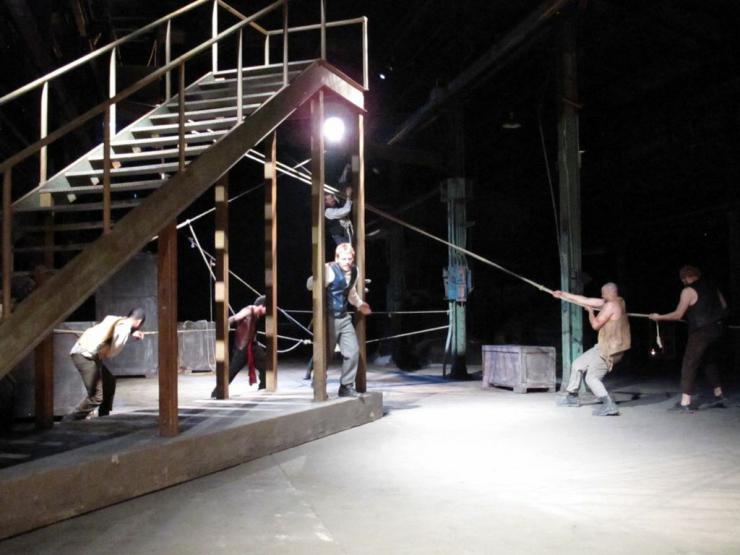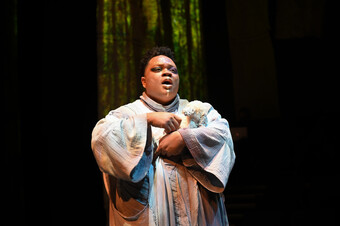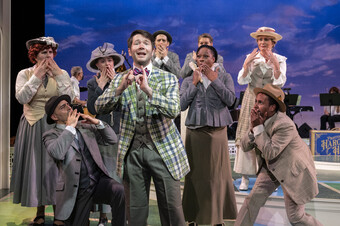Atlanta's Saiah seeks to transform the Great American Novel into the Great American Play
Can the Great American Novel become a great American play? When the novel is Herman Melville's Moby-Dick, the answer would seemingly be a resounding, "No." All novels resist adaptation to some degree, but Moby-Dick seems almost designed to be difficult to bring to the stage: Most of the action takes place at sea, there are lengthy non-narrative digressions about the minutiae of whale-hunting, and one of the primary characters weighs ninety tons and lives beneath the ocean.
Of course, one of the major challenges of bringing Moby-Dick to the stage is bringing a whale into the theatre.
But the new Atlanta-based theatre company Saiah approached the task of creating a stage production of the novel Moby-Dick with enough energy, passion, invention, and seriousness of purpose to create a convincing case for its adaptability. The production ran from April 10 to May 12 in a warehouse in Atlanta's West End neighborhood.
The novel's sense of grandeur and epic monumentality were matched by the vast space of the venue, a 1914 former sprocket factory now used as a recycling center for salvaged building materials. Guided by attendants with lanterns, audience members followed the narrator Ishmael (actor Grant McCloud) through the expansive warehouse's interior and exterior, as the first half of the show dramatized Ishmael's journey from Manhattan to New Bedford to Nantucket. An old loading dock doubled as a New England Wharf; a little first story nook became a New England inn; and pews lined up in front of a podium became a New Bedford chapel. The audience eventually settled into place in chairs in the warehouse's central space, here doubling as the deck of the whaling ship "Pequod," where the bulk of the play's action took place.

Of course, one of the major challenges of bringing Moby-Dick to the stage is bringing a whale into the theater. Rather than trying to bring a whale to stage with special effects or have a character play the whale itself (both seem primed to become camp disasters), Atlanta-based scriptwriter John Gentile went with a more abstract idea of having a female actress—the only female performer in the show—play the Whiteness of the Whale. The massiveness of the whale wasn't emphasized on stage, but its transcendent qualities were: its ineffability, its mysteriousness, its otherness, its beauty. The play opened not with Ishmael introducing himself, but with actress Briana Brock, who played the Whiteness, discoursing in Melville's words on the subject of whiteness itself (the only one of Melville's discursive sections from the book brought to the stage: the show otherwise stuck to the narrative action of Melville's novel). The innovation of the Whiteness as a character didn't just solve a practical staging problem, but brought out a wonderful haunted quality in the story within the industrial atmosphere of the evocatively crumbling, dark warehouse: the space could alternately suggest a whaling ship, the belly of the whale, an endless sea. British musician Piers Caldwell's eerie soundscape completed the picture, often giving the production the feel of a haunted house, which was a strangely fitting element to tease out of the tale of obsession and terror, bordering on the supernatural.

Many readers might remember Moby-Dick as the doorstop-sized tome they were forced to read in high school English class, but the production brought out the novel's true sense of liveliness and narrative pull, its sense of activity and movement.
Certainly, Captain Ahab must be one of the most complicated and challenging characters in all of literature, along the lines of Hamlet or King Lear in terms of complexity and modernity and the monumental, universal implications of their situations. Phillip Justman as Captain Ahab brought out the darkly tortured, philosophical aspect of Ahab's character: it would be easy to descend into sea-faring captain clichés and camp, but he played the character as intelligent, self-knowing form of obsession.
The production was not without its challenges. The vast space proved difficult for the cast acoustically: words, and sometimes even whole lines, could be lost in the enormous warehouse. Echoing noise and a sense of vastness suited big scenes, such as when a mobile metal staircase doubled as a harpoon boat, but intimate scenes, such as between Ahab and Starbuck, still often had to be shouted, which often diminished their sense of drama and immediacy. During the seated portion of the show, action took place all around the audience: some scenes necessitated a bit of awkward turning or even uncertainty about where to look.
Still, what was most impressive was the group's willingness and ability to take on a behemoth, without descending into easy irony or camp humor. An incisive understanding of what makes the novel great, coupled with a genuine reverence for Melville's text, made for an amazing show. Ultimately, any great story is suited for the stage if it's told well enough.









Comments
The article is just the start of the conversation—we want to know what you think about this subject, too! HowlRound is a space for knowledge-sharing, and we welcome spirited, thoughtful, and on-topic dialogue. Find our full comments policy here
I am a Brit who has never read Moby Dick, but flatter myself that I have superb taste in theatre (I go to London most years and practically camp out at the National.) It was a delight and privilege to see Saiah's production of Moby Dick in Atlanta, one of the most striking and creative evenings of theatre I have ever experienced. This company is going places.